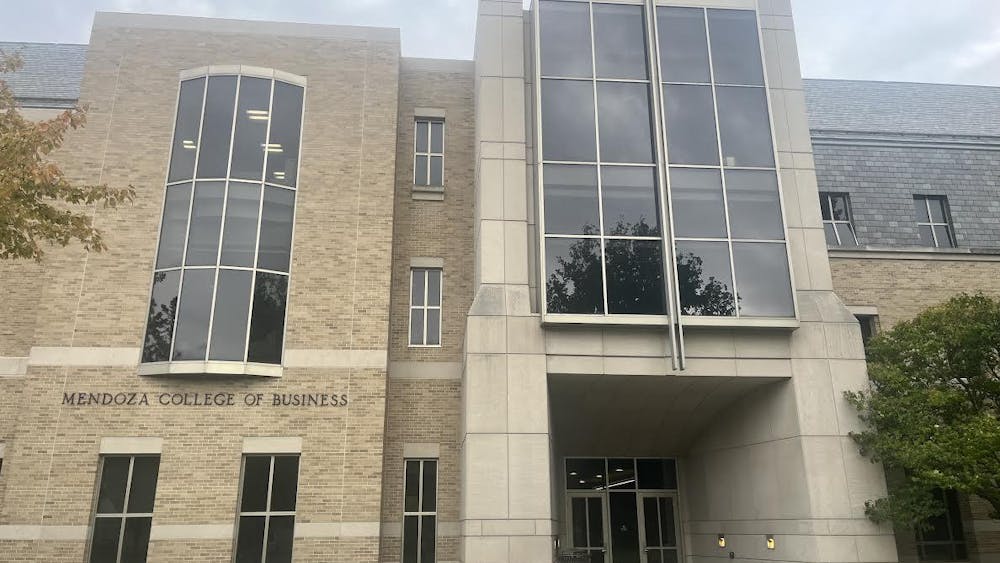Over the past year, most recently with a March 6 Chicago Tribune op-ed, Keough School professors Tamara Kay and Susan Ostermann have co-written 10 pro-choice op-eds together.
Kay, however, has been the primary target of public outcry since an Irish Rover article claimed in Oct. 2022 that she “offers abortion access to students.” Its argument centered around messaging on a sign on her door, which Kay said in a since-deleted tweet “was not about abortion,” according to Fox News.
She told the New York Magazine that harassment intensified following Notre Dame President Fr. John Jenkin’s Dec. 6 letter to the editorpublished by the Chicago Tribune distancing the University from an op-ed written by Kay and Ostermann the day before.
Kay hired a lawyer in December to pressure the University to protect her from harassment, and she is currently considering legal action against the Rover and the University.
Since The Cut and The Observer published articles earlier this month, a GoFundMe raising money for Kay’s legal expenses has increased from $8,007 to over $12,000.
May 2022: Ostermann and Kay begin series of op-eds
On May 4, 2022, Salon published the first of Ostermann’s and Kay’s pro-choice op-eds in a piece titled, “Forced pregnancy and childbirth are violence against women — and also terrible health policy.”“While pregnancy can be a joyous and miraculous event for those who freely choose it, forced pregnancy and childbirth is violence. It is sexual abuse. It is trauma,” the professors wrote. “We know this because it happened prior to the Roe v. Wade in the U.S., and it happens all over the world.”
Two days later, the Los Angeles Times published another piece co-written by the professors titled “Pregnancy is risky. Losing access to abortion puts women’s lives at stake.” Later in May, another op-ed written by Kay and Ostermann, comparing abortion access for women in the U.S. and women in the U.K., was published on the British Sociological Association’s website.
The majority of the ten op-eds included a disclaimer at the end, such as the one included in the Salon op-ed, that “the authors’ opinions are their own, and do not necessarily reflect those of the University.”
Following the Supreme Court’s June 2022 decision overturning Roe v. Wade, which negated the existence of a constitutional right to abortion, Kay and Ostermann wrote five more pro-choice op-eds throughout July and August.
Oct. 12: Irish Rover article sparks outrage
An Oct.12 article published in the Irish Rover, written by its editor-in-chief, W. Joseph DeReuil, claimed that Kay was working “to bring abortion to Notre Dame students.”Further, in an article published the same day as the one in the Rover, DeReuil wrote a piece for the National Catholic Review (NCR) titled, “What You Should Know About Notre Dame Professor’s Promotion of Abortion to Students,” adding some commentary on what Notre Dame should do about the situation.
“Despite Notre Dame being a school dedicated to promoting human dignity and the common good, Kay has loudly demonstrated the failure of this school to uphold the vision of the Catholic Church in both of these matters,” DeReuil said in the NCR piece. “Statewide abortion bans will demonstrate more than ever before where deficiencies in early child care and support exist. Notre Dame, the best-financed Catholic university in the country, is ideally situated to set an example of what this support can and should look like.”
The Irish Rover’s October article received national attention, being promoted by various conservative media outlets, including on Fox News’ and Breitbart’s websites. The article was also reposted on the Notre Dame website by the Right to Life club.
Kay told The Cut that she began receiving harassment via email, including rape and death threats, after The Irish Rover published its piece.
December: Chicago tribune op-ed followed by Fr. Jenkins’ response the next day
Ostermann’s and Kay’s next op-ed was publishedDec. 5 in the Chicago Tribune. In the piece, they argued that health policy on abortion issues has been dictated by lies, referring to common conceptions on the topic of abortion such as, “abortion bans prevent abortion,” “abortions kill babies” and “abortions are dangerous."The next day, though the Dec. 5 op-ed stated at the end once again that “the authors’ opinions are their own and do not necessarily reflect those of the University,” Jenkins disavowed the professors’ op-ed while stressing their freedom to express their opinions.
“Regarding their op-ed, ‘Lies about abortion have dictated health policy’ in the Dec. 5 Chicago Tribune, Tamara Kay and Susan Ostermann are, of course, free to express their opinions on our campus or in any public forum,” Jenkins wrote. “Because they chose to identify themselves as Notre Dame faculty members, I write to state unequivocally that their essay does not reflect the views and values of the University of Notre Dame in its tone, arguments or assertions.”
A few days later, on Dec. 13, Notre Dame political science professor Daniel Philpott stepped into the debate against Ostermann and Kay with an op-ed in the NCR, originally published on his blog, Arc of the Universe. His op-ed did not have a disclaimer attached to it that the author’s views were unreflective of the University’s.
Jan. 24: GoFundMe created
A fundraiser on the crowdfunding platform GoFundMe titled “Supporting Tamara Kay and academic freedom” was created by Kay’s colleague Susan St. Ville on Jan. 24 of this year. The fundraiser’s homepage described Kay as the target of a “dangerous amount of harassment, including threats” from anti-abortion advocates.“Prof. Kay was the subject of defamatory stories posted by white nationalist hate groups and by the Irish Rover, an online publication that, though not affiliated with the University, is written by Notre Dame students and lists several faculty members as advisors,” the page reads.
By writing the letter to the editor in The Chicago Tribune, the fundraiser’s description said Jenkins was “violating the University’s academic freedom policies. The statement caused an escalation in harassment against Prof. Kay, who had to teach her final class of the semester with police monitoring the hallway outside her classroom.”
February: Statements continue indirect debate over the controversy
Without mentioning the controversy surrounding Kay — who holds appointments in both sociology and global affairs — directly, Notre Dame’s department of sociology released a statement entitled “Notre Dame Leaders Must Stand up Against Hate” on Feb. 8, calling to attention the importance of academic freedom at the University and lamenting the harassment that researchers have faced for their work.“We stand with our Notre Dame colleagues who have recently endured vitriolic verbal attacks and threats of violence for exercising their academic freedom in research and writing related to reproductive health access and abortion bans,” the statement reads. “Disturbingly, some threatening messages have come from ND parents and alumni, in direct response to reportage and published letters from University-connected entities that believe this research runs counter to the Catholic mission. These acts of violence, including verbal and written harassment, are outrageous, unacceptable, and dangerous for our entire community.”
A statement released the same day by student club Notre Dame Right to Life disagreed. Authored by then-president Merlot Fogarty, the statement was entitled “The Notre Dame Community Stands Up Against Violence.”
Linking to the sociology department’s statement, Fogarty wrote, “In the context of ongoing campus debate over the morality, legality, and justice of abortion, Notre Dame is uniquely positioned to be the model for Catholic institutions committed to protecting students, women, and the sanctity of life.”
Fogarty also celebrated Jenkin’s “witness to the sanctity of human life” through his Chicago Tribune disavowal, and questioned claims of academic freedom, saying the violence committed through abortion was a far more significant threat.
“Those who are truly threatened by this violence [abortion] don’t have the voice to speak up for themselves,” she wrote. “By contrast, academic reputation, tenure, and the ability to publish in national media outlets are all privileges that should not be weaponized to insulate their holders from criticism under the guise of ‘academic freedom.’”
The department of sociology’s statement urged Jenkins to take action immediately against infringements on scholarship at the University.
“University president John Jenkins has spoken in the past about the importance of engaging in civil discourse. Now, more than ever, we need him and other Notre Dame leaders to ensure a culture of civility by publicly condemning the actions of those who so badly misunderstand the mission of a great Catholic university,” the statement said.
On Feb. 20, Jenkins released a statement affirming the University’s commitment to academic freedom, writing that “scholars and students in our community have the freedom to express their views on any matter.”
Jenkins added that the University has a unique opportunity to react with strength to politically polarizing times by engaging in respectful dialogue between disagreeing parties.
“To the extent we can combine the passionate pursuit of truth through inquiry and dialogue with respect toward those with whom we disagree, we will be a community animated by the love of truth we seek and charity toward the colleagues and students who are companions in this search,” Jenkins said.
In an email to The Observer, University spokesperson Dennis Brown said the Feb. 20 statement was responding to national trends of intense discourse relating to issues of free expression on college campuses.
“Academic freedom and free expression in higher education have been much in the news in recent months — from controversial courses and speakers on campuses, to DEI debates, to the place of tenure and decisions by politicians and trustees,” Brown said. “Given these many conversations across the country, Father Jenkins took the opportunity [in the statement] to reinforce his position.”









